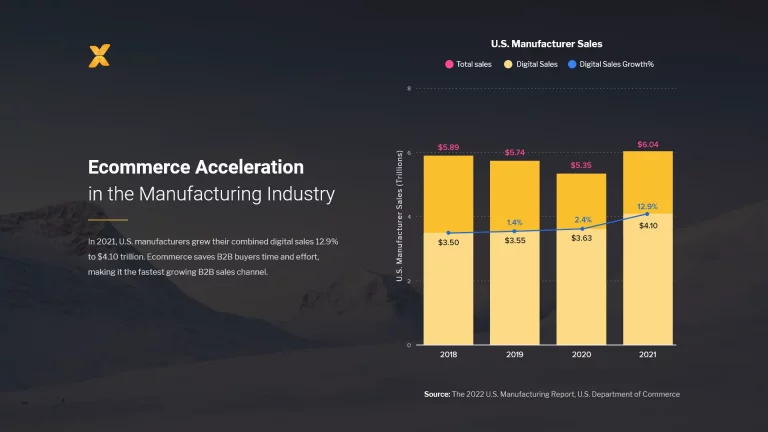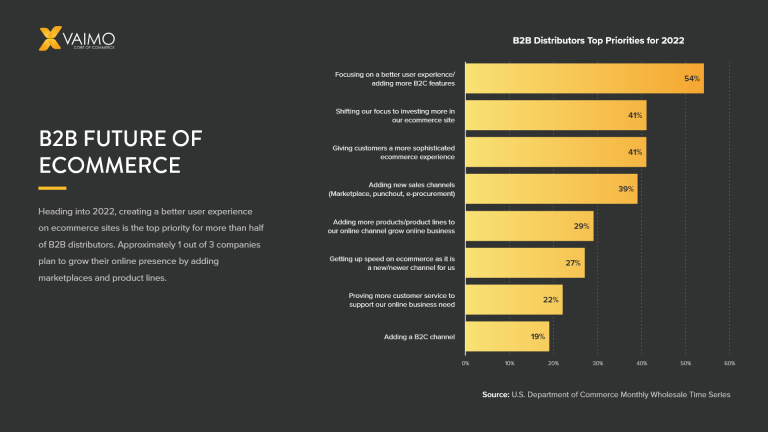With the pandemic shifting every aspect of how we do business, marketing budgets in 2020 saw an impact as well. Not only were companies looking for ways to cut costs, but many traditional marketing avenues were no longer a valuable investment.
For B2B companies in 2021, it will be critical to continue to prioritize the right investments in marketing and customer experience, specifically within digital verticals.
The key to creating a successful marketing budget in 2021 for B2B commerce will involve careful consideration of how that money will be spent and how to best reach customers in a business world unlikely to return to previous norms.
By understanding how B2B marketing budgets have shifted in the past year and what the best approach to the year ahead is, businesses will be prepared for the post-pandemic new normal and will speed up their return to pre-pandemic revenues and sales.
The Interesting Case for Marketing Budgets in 2021
While there is no doubt that companies reduced spending across the board in 2020, marketing budgets were interestingly not affected in the ways one might assume.
In the CMO Survey, over 2,000 top marketers were asked to report how their marketing spend had been impacted by COVID and what expectations these marketing firms have for the future.
The following key findings help shape the case for why marketing budgets will only continue to gain importance for B2B companies in the year ahead:
- According to the survey, while marketing departments did suffer from headcount loss, 30.3% of the marketers experienced no change in their overall marketing budgets during the pandemic. In fact, marketers reported that they gained about 5% in overall digital and non-digital budgets in April and May of 2020.
- Interestingly as well, in the survey, marketers reported that while overall budgets and revenues were dropping, marketing budgets as a percentage of overall budgets and revenues were the highest ever reported by CMO survey, at 12.6% and 11.4%, respectively. This finding points to the reality that while companies saw a reduction in revenues and cut costs, they did not reduce their marketing budgets to the same degree as other budget areas. Rather, during the pandemic, companies retained their focus on maintaining brand awareness and acquiring customers throughout COVID.
- On average, companies surveyed cite a 10% increase in their overall marketing budget. Within B2B, both B2B Product and B2B Services companies had higher than average marketing budget increases (11.3% and 10.3%, respectively) compared to B2C Product and B2C Services (8.7% and 8.4%).
- In terms of marketing priorities, across all companies surveyed, digital marketing and brand building have the highest growth (14.3% and 9.5%, respectively). In contrast, traditional advertising expenditures are expected to have a .2% decline.
- On the topic of digital marketing budgets, the survey also found that around half of all digital marketing budgets remained unchanged during COVID-19. The ones that did experience change were predicted to be restored within a month.
Now, here we are more than a year later, and the risks of exposure to COVID-19 remain high in the US. Many businesses remain remote, and the world as we knew it pre-COVID has not returned.
With over a year of building digital habits, it is now likely that the way businesses operate will be forever changed. The days of cramming dozens of people into a small conference room rather than hopping on a Zoom call could be sunsetted into perpetuity.
For this reason, B2B businesses, which historically relied heavily on face-to-face meetings and in-person marketing tactics, such as tradeshows and major events, will need to shift their focus to marketing tactics that will be successful in the post-pandemic world.
The reality is that trust must still be built between businesses, and the human need for connection to a friendly face is as strong as ever before. Creating the right marketing budget for 2021 will require careful consideration of what this new landscape will look like in the year ahead.
How to Approach Marketing Budgets for B2B Businesses
Evaluation Process
When determining how to allocate your marketing budget, the first step for B2B commerce companies is to evaluate what has worked well over the past pandemic-riddled year and which changes in customer behavior are likely to be here to stay.
Begin by evaluating the changes in your business interactions. How did you and your customers navigate the new environment during COVID? What worked and what did not? There may be new protocols that were established due to necessity. Keep an open mind to help you determine how to leverage the most effective ways to go to market and engage your customers.
The best approach to understanding what changes will be permanent for the businesses you interact with is to ask. Reach out. Show that your company cares about the hurdles your customers are facing. Don’t reach out as a marketing tactic or to outdo your competition, but rather, to offer genuine support.
Building trust in a digital world isn’t as natural as when we could meet in person, shake hands over meals, and connect human-to-human. As you evaluate what worked well over the past year, take some time to hear from your customers and lend a genuine hand.
Digital Acceleration
Realistically, the pre-pandemic world where meeting with a potential client face-to-face was the start of a sales relationship is not likely to ever return.
Rather, many of the COVID forced digital-first approaches that emerged over the past year are the new norm.
A year later, it is obvious that B2B businesses must focus their marketing dollars on digital acceleration. Digital-first relationships take numerous forms, which makes it critical for marketers to be agile and innovative. While your business’ web presence may have taken a back seat in the days of happy hour meet and greets, 2021 promises to reward those who have a stronger digital presence.
Digital acceleration in B2B Commerce might mean hosting virtual events, curating online experiences for customers, and improving the art of online connection.
Quality Content Creation
While content has played a large role in the world of marketing for over a decade, B2B companies will need to emphasize the amount of content they produce in the year ahead and the quality of that content.
Content in 2021 should foster true connection. A return to empathy is needed, and an emotional touch will set one business apart from another. Rather than simply driving a bottom-line message, content should focus on providing true value for the person on the other side.
While all the traditional digital content staples—such as well-written landing pages, compelling blog posts, and insightful white papers—will be there in the year ahead, the virtualization of the world will place increased importance on quality video and interactive content.
Additionally, in the year ahead, businesses will need to consider how they store content, how it is leveraged across teams, and how scaleable current digital platforms are for their business.
Understanding and Targeting Customers
As 2020 floored the gas on digital acceleration, an interesting trend emerged—consumers began to demand more personalized experiences. With industry leaders in every sector learning how to better harness customer data from online interactions, the level of personalization increased. As customers became accustomed to this, they began expecting it.
A successful marketing budget in 2021 must include spending on data analysis. Businesses need to capture critical data sets from digital interactions and leverage that data to build a targeted approach to future marketing tactics.
Building Capabilities for a Fast-changing Environment
If the past year taught businesses anything, it is that you cannot predict the future, and you must be capable of adapting to a fast-changing environment. This has been the key differentiator between businesses that succeeded and grew in 2020 and those that failed and shut their doors.
A constantly changing environment requires constant learning and adaptation. In the year ahead, you must remain relevant with your marketing and sales strategies. Crisis requires rapid research and the ability to understand changing dynamics and new customer pain points. Ask yourself how agile your business is and how innovative your solutions are when unexpected events arise?
B2B marketers who can build the right capabilities to adapt to a fast-changing environment will stand out and attract new customers, out-pacing the competition. As the dust of a new, post-COVID reality begins to settle, the organizations that were willing to experiment, research, and innovate will have far more opportunities in the year ahead than those that remained unwilling to change.
Creating a Strategy for 2021
Marketing budgets will be central to the success of B2B commerce in the year ahead and there is no better time than now to build your digital strategy to ensure the best success in a post-pandemic world.
At Vaimo, we provide industry expertise in omnichannel retailing and can help your B2B business adapt to the new digital landscape. By gathering data from your customers, learning their patterns, and discovering the pain points, we can help optimize your digital experience, and ensure that you’ll still create meaningful connections, and build trust and loyalty with your consumers, even without face-to-face interactions. Get in touch with our team here.







